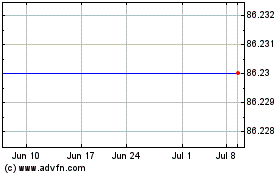Microsoft to Unveil Version of Windows Server Running on ARM Chips
March 08 2017 - 9:44AM
Dow Jones News
By Ted Greenwald
Microsoft Corp. on Wednesday will demonstrate a version of its
server operating system running on processors based on technology
from ARM Holdings PLC, throwing its weight behind efforts to crack
Intel Corp.'s near-total dominance in data-center chips.
The move is a marked change for Microsoft, which for years has
built Windows Server to run on chips designed around technology
from its once-steady partner Intel.
Microsoft said in a blog post planned for Wednesday it
collaborated with Qualcomm Inc., the leading supplier of chips for
smartphones, and Cavium Inc., a lesser-known Silicon Valley chip
maker, to adapt Windows Server to run on their ARM server chips. It
worked with several ARM suppliers to optimize their chips for its
data-center needs, it said.
The ARM version of Windows Server, which is scheduled to be
demonstrated at a Silicon Valley conference devoted to open
standards in computing hardware, was developed for internal use in
Microsoft's Azure cloud-computing service, the blog post said.
Through testing, Microsoft said it found ARM server chips
"provide the most value" for certain cloud tasks including search
and machine learning.
"We feel ARM servers represent a real opportunity and some
Microsoft cloud services already have future deployment plans on
ARM servers," the company said.
At the open-hardware conference, Qualcomm plans to announce an
open-source design for a server using its ARM-based Centriq 2400
server chip that is compatible with Microsoft standards for
cloud-computing systems.
Chips based on ARM technology are one aspect of an effort by
many semiconductor companies to challenge Intel in the server
market, where the Silicon Valley giant generated $17.2 billion in
annual revenue last year and holds nearly 100% share, according to
Mercury Research.
"We're not interested in felling the giant in one fell swoop,"
said Anand Chandrasekher, senior vice president of Qualcomm Data
Centers. "We're going to be chipping away."
Other chip makers are taking different approaches to challenging
Intel. Advanced Micro Devices Inc. on Tuesday issued specifications
and performance benchmarks for a server chip, based on its new Zen
architecture, that it said would reach the market in the next few
months. International Business Machines Corp. has said it would
ship new server chips based on its own designs in the second half
of the year.
"We take all competition seriously," Intel said, responding to
AMD's announcement, "but we have to wait and see if the claims
match the realities, especially with real-world applications."
Intel expects later this year to launch its own next-generation
chips, and it is moving aggressively to capitalize on its
acquisitions of Altera Corp. and Nervana Systems, makers of key
technologies for boosting computing performance.
ARM technology, while an overwhelming favorite in smartphone
chips, has faced a rough road in the server market. Several
companies including Advanced Micro Devices Inc., Broadcom Co. and
Texas Instruments Inc. have tried to bring ARM-based chips to the
market with little to show for it.
"This class of product does not scale well for servers," said
Martin Reynolds, vice president and research fellow with Gartner
Inc. "It is definitely possible to build an ARM chip optimized for
servers, but it requires considerable investment in design
techniques, with limited payoff."
The biggest hurdle has been matching the performance per dollar
and per watt of Intel's chips, industry watchers say.
Another issue: Software coded for Intel-style processors must be
reworked to run on the ARM architecture. That is likely a deal
breaker for corporate customers but less of a barrier for large
cloud-computing providers such as Microsoft, since they build their
own data-center software and run it on immense numbers of
computers.
That scale makes it "more economically feasible to optimize the
hardware to the [computing] workload instead of the other way
around," Microsoft said in its blog post, even if that means
switching from Intel to ARM-based chips.
In a separate blog post, Microsoft said it had struck separate
design partnerships with AMD, Intel, and Nvidia Corp. Qualcomm also
is working with Red Hat Inc. and Canonical Ltd. to adapt the Linux
operating system to run on its chips.
Jay Greene contributed to this article.
Write to Ted Greenwald at Ted.Greenwald@wsj.com
(END) Dow Jones Newswires
March 08, 2017 09:29 ET (14:29 GMT)
Copyright (c) 2017 Dow Jones & Company, Inc.
Cavium, Inc. (delisted) (NASDAQ:CAVM)
Historical Stock Chart
From Mar 2024 to Apr 2024

Cavium, Inc. (delisted) (NASDAQ:CAVM)
Historical Stock Chart
From Apr 2023 to Apr 2024
